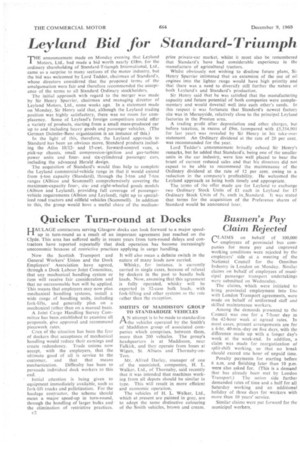Leyland Bid for Standard-Triumph
Page 38

If you've noticed an error in this article please click here to report it so we can fix it.
THE announcement made on Monday evening that Leyland Motors, Ltd., had made a bid worth nearly £18m. for the ordinary shareholding of Standard-Triumph International, Ltd.. came as a surprise to many sections of the motor industry, but the bid was welcomed by Lord Tedder, chairman of Standard's, whose directors considered that the proposed terms of the amalgamation were fair and therefore recommended the acceptance of the terms to all Standard Ordinary stockholders.
The initial approach with regard to the merger was made by Sir Henry Spurrier, chairman and managing director of Leyland Motors. Ltd„ some weeks ago. In a statement made on Monday, Sir Henry said that, although the Leyland trading position was highly satisfactory, there was no room for complacency. Some of Leyland's foreign competitors could offer a variety of products, starting from a small mass-produced car up to and including heavy goods and passenger vehicles. (The German Daimler-Benz organization is an instance of this.) In the light of this, therefore, the Leyland approach to Standard has been an obvious move, Standard products including the Atlas 10112and 15-cwt. forward-control vans, a pick-up chassis, small compression-ignition and gas-turbine power units and fourand six-cylindered passenger cars, including the advanced Herald design.
The acquisition of Standard's would thus help to complete the Leyland commercial-vehicle range in that it would extend from fton capacity (Standard), through the 3-ton and 7-ton ranges (Albion and Searrimell) comprehensively covering the maximum-capacity four-, sixand eight-wheeled goods models (Albion and Leyland), providing full coverage of passengervehicle requirements (Albion and Leyland), right up to specialized road tractors and oilfield vehicles (Scammell). In addition to this, the group would have a useful share of the medium
price private-car market, whilst it must also be remembered that Standard's have had considerable experience in the manufacture of agricultural tractors.
Whilst obviously not wishing to disclose future plans, Sit Henry Spurrier intimated that an extension of the use of oil engines into the lighter range would have high priority and that there was a need to diversify still further the nature of both Leyland's and Standard's production.
Sir Henry said that he was satisfied that the manufacturing capacity and future potential of both companies were complementary and would dovetail well into each other's needs. In this respect it was fortunate that Standard's newest factory site was in Merseyside, relatively close to the principal Leyland factories in the Preston area, A trading profit after depreciation and other charges, but before taxation, in excess of £9m. (compared with £5,334,901 for last year) was revealed by Sir Henry in his take-over statement. An Ordinary dividend at the rate of 20 per cent. was recommended for the year.
Lord Tedder's announcement broadly echoed Sir Henry's remarks, but he added that Standard's, being one of the smaller units in the car industry, were less well placed to bear the brunt of current reduced sales and that his directors did not expect to be able to recommend the maintenance of the Ordinary dividend at the rate of 12 per cent. owing to a reduction in the company's profitability. He welcomed the Leyland approach as being both timely and appropriate.
The terms of the offer made are for Leyland to exchange two Ordinary Stock Units of £1 each in Leyland for 15 Ordinary Stock Units of 5s. each in,Standard. It was stated that terms for the acquisition of the Preference shares of Standard would be announced later.
























































































































